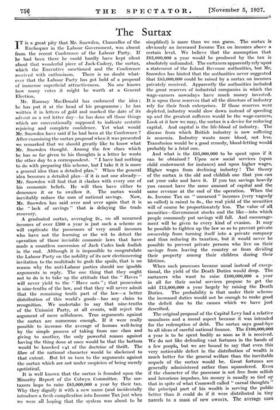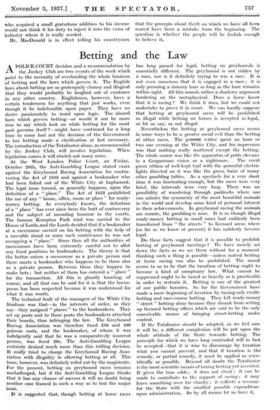The Surtax
IT is a great pity that Mr. Snowden, Chancellor of the Exchequer in the Labour Government, was absent from the recent Conference of the Labour Party. If he had been there he could hardly have kept silent about that wonderful piece of Jack-Cadery, the surtax, which the Executive sanctioned and the Conference received with enthusiasm. There is no doubt what- ever that the Labour Party has got hold of a proposal of immense superficial attractiveness. No one knows how many votes it might be worth at a General Efection.
Mr. Ramsay MacDonald has embraced the idea ; he has put it at the head of his programme ; he has written it in letters of gold and marked the date of its advent as a red letter day—he has done all those things which are conventionally supposed to indicate ecstatic rejoicing and complete confidence. Yet what would Mr. Snowden have said if he had been at the Conference ? After examining the surtax proposal when it was presented we remarked that we should greatly like to know what Mr. Snowden thought. Among the few clues which he has so far given to his thoughts is a letter he wrote the other day to a correspondent. " I have had nothing to do with preparing this scheme, but I take it it is more a general idea than a detailed plan." When the general idea becomes a detailed plan—if it is not one already— Mr. Snowden will find that it clashes with every one of his economic beliefs. He will then have either to denounce it or to swallow it. The surtax would inevitably reduce the sum of national savings. Now, Mr. Snowden has said over and over again that it is the " lack of savings " that is delaying the trade recovery.
A graduated surtax, averaging 2s., on all unearned incomes of over £500 a year is just such a scheme as will captivate the possessors of very small incomes who have not the learning or the wit to detect the operation of those invisible economic laws that have made a countless succession of Jack Cades look foolish in the end. Although it is impossible to congratulate the Labour Party on the nobility of its new electioneering invitation to the multitude to grab the spoils, that is no reason why the anti-Labour parties should use ignoble arguments in reply. The one thing that they ought not to do is to take up the attitude that the " Haves " will never yield to the " Have nots " ; that possession is nine-tenths of the law, and that they will never admit that the remaining tenth part of the law—a better distribution of this world's goods—has any claim to recognition. We undertake to say that nine-tenths of the Unionist Party, at all events, will reject the argument of mere selfishness. True arguments against the surtax are numerous enough. If it were really possible to increase the average of human well-being by the simple process of taking from one class and giving to another, the only powerful reason against having the thing done at once would be that the bottom would be knocked e-it of the doctrine of thrift. The fibre of the national character would be slackened to that extent. But let us turn to the arguments against the surtax which are not under suspicion of being merely egotistical.
It is well known that the surtax is founded upon the Minority Report of the Colwyn Committee. The sur- taxers hope to raise £85,000,000 a year by their tax. Why they dignify it with a new name (and incidentally introduce a fresh complication into Income Tax just when we were all hoping that the system was about to be simplified) is more than we can guess. The surtax is obviously an increased Income Tax on incomes above a certain level. We believe that the assumption that £85,000,000 a year would be produced by the tax is absolutely unfounded. The surtaxers apparently rely upoii a statement of the Inland Revenue authorities, but Mr: Snowden has hinted that the authorities never suggested that £85,000,000 could be raised by a surtax on incomes privately received. Apparently the authorities included the great reserves . of industrial companies in which the wage-earners nowadays have much money invested: It is upon these reserves that all the directors of industry rely for their fresh enterprises. If those reserves were depleted, industry would slow down instead of speeding up and the greatest sufferers would be the wage-earners: Look at it how we may, the surtax is a device for reducing capital. And capital is the life-blood of industry. The disease from which British industry is now suffering is anaemia. Industry wants more blood, not less: Transfusion would be a good remedy, blood-letting would probably be a fatal one. • And what is the £85,000,000 to be spent upon if it can be obtained ? Upon new social services (upon child endowment for instance) and upon higher wages: Higher wages from declining industry ! The theory of the surtax is the old and childish one that you can eat your cake and have it. If you tax savings heavily you cannot have the same amount of capital and the same revenue at the end of the operation. When the 4s. Income Tax on " unearned " incomes (very vaguely so called) is raised to 6s., the real yield of the securities will of course be proportionately less. The value of all, securities—Government stocks and the like—into which people commonly put savings will fall. And encourage- ment will be given to every kind of evasion. It may be possible to tighten up the law so as to prevent private ownership from turning itself into a private company and thus reducing its taxation, but it would never be possible to prevent private persons who live on their savings from leaving the country or from dividing their property among their children during their lifetime.
When such processes became usual instead of excep- tional, the yield of the Death Duties would drop. The surtaxers who want to raise £100,000,000 a year in all for their social services propose to get the odd £15,000,000 a year largely by raising the Death Duties. The probability is that under their scheme the increased duties would not be enough to make good the deficit due to the causes which we have just described.
The original proposal of the Capital Levy had a relative soundness and a moral aspect because it was intended for the redemption of debt. The surtax says good-bye to all ideas of careful national finance. The £100,000,000 a year is to be spent bodily as soon as it is received. We do not like defending vast fortunes in the hands of a few people. but we are bound to say that even this very noticeable defect in the distribution of wealth is much better for the general welfare than the inevitable sequels of the surtax would be. Great fortunes are generally administered rather than squandered. Even if the character of the possessor is not free from selfish and luxurious impulses, his money is usually so tied up that in spite of what Cromwell called " carnal thoughts " the principal part of his wealth is serving the public, better than it could do if it were distributed in. tiny parcels to a mass of new owners. The average man who acquired a small gratuitous addition to his income would not think it his duty to inject it into the veins of industry where it is really needed.
Mr. MacDonald is in effect telling his countrymen that the precepts about thrift on which we have all been reared have been a mistake from the beginning. The question is whether the people will be foolish enough to believe it.



















































 Previous page
Previous page